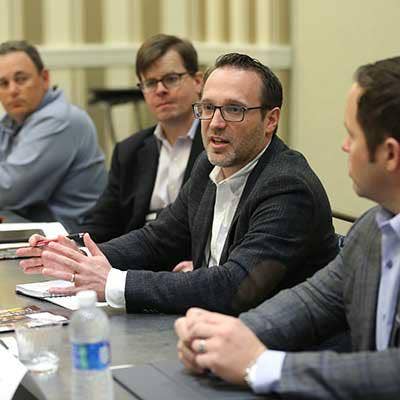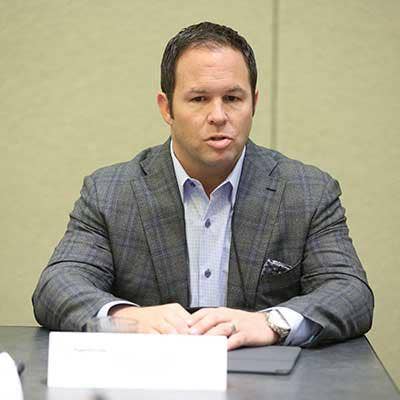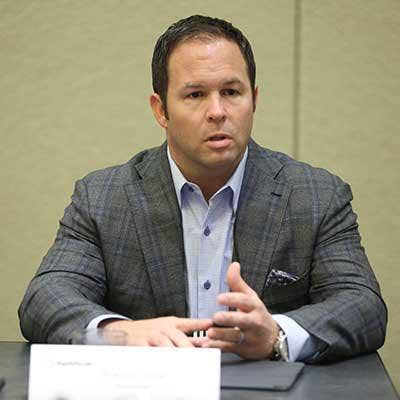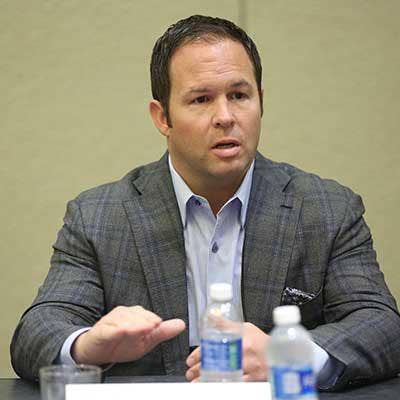CRN Cloud Services Roundtable: 10 Ways Cloud Service Providers Say They Are Beating The Behemoths

Beating The Big Players At Their Own Game
During a roundtable at the XChange Solution Provider 2017 conference hosted by CRN parent The Channel Company, executives from four cloud service providers sat down with CRN to share their secrets to success. These channel-friendly cloud service providers are winning business in the crowded marketplace, even against the likes of cloud giants such as Amazon Web Services.
Seated at the table were Scott Kinka, CTO and founding partner of Evolve IP; Keith Coker, CTO and founder of Green Cloud Technologies; Randy Jeter, CEO of RapidScale; and Andy Stewart, chief strategy officer for TierPoint.
The executives shared how Amazon Web Services' widely publicized cloud outage in March highlighted the pitfalls of working with a hyper-scale cloud provider and how their services -- combined with their channel focus -- are helping them differentiate themselves from the popular cloud players.

Channel Focus
Cloud service providers that choose to embrace the channel are having an easier time competing with the large players in the cloud market, including Amazon Web Services, executives at the roundtable said. That's because many businesses want to work with their trusted solution providers for a more "hands-on" approach to the cloud, they said.
Today, Wayne, Pa.-based Evolve IP does 65 percent of its business through the channel. St. Louis-based TierPoint did about 23 percent of its bookings through partners in 2016 and hopes to grow that percentage by one-third over the next year. Green Cloud Technologies, based in Greenville, S.C., and Irvine, Calif.-based RapidScale have both chosen to go all in with the channel. Neither company has a direct sales force.

Higher Margins
Reselling cloud services from a large player like Amazon Web Services, Google or Microsoft translates to low profit margins for channel partners because they are selling commodity Infrastructure-as-a-Service that is consistently dropping in price, the executives said. However, selling cloud from a cloud service provider with value-added services wrapped around the offering is where the value -- and more margin -- lies for channel partners, they said.
"We’ll never be just a pure reseller. There’s not enough margin. There’s not enough value to it, but that in conjunction with the other services is good for our channel partners, and good for the customer," TierPoint's Stewart (pictured) said.

Compensation Models
Channel-friendly cloud service providers give partners the opportunity to resell cloud and receive compensation that makes sense for their business. For agent partners used to subscription-based services, these partners can be paid out in a monthly recurring model. For partners that are used to receiving one large payout, some cloud service providers will work with these partners and pay them in a similar fashion or offer a "hybrid" compensation model for those looking to get into recurring revenue.
"We give [VAR partners] the opportunity to ratchet back into being a large, lump sum payment up front if they take less of the residual over time. They can ratchet it down over time. Basically, they get a stepping program," Evolve IP's Kinka (pictured) explained. "[These partners] will make less money over time on the business where they’re taking the up-front payment, but they can at least bridge the gap a little bit. They can ratchet their way in."

No Hidden Costs
Buying services from a large cloud provider isn't always transparent to a business from a price perspective because costs can change with usage, the executives said. Oftentimes, businesses don't fully understand the cost structure of a cloud provider or, the complexity of the hyper-scale cloud provider's environment could burden their IT staff, according to Green Cloud's Coker (pictured).
This is where cloud service providers have an advantage, he added.
"[Green Cloud] chose VMware’s Hypervisor, which is a well-known hypervisor, and so the fact that they can move back into something that’s more comfortable, that’s more knowledgeable to the IT staff, gives them a place of refuge to leave one of the hyper-scale guys."

Redundancy
If nothing else, the wide-scale Amazon Web Services outage earlier this month shinned a light on redundancy -- or lack thereof, the executives said. Hyper-scale cloud providers don’t help businesses design for failure, but cloud service providers, in conjunction with their channel partners, can intelligently craft a cloud solution that includes uptime expectations and failover, the executives said.
"Often, companies sit back and [say], 'What happened? We’re out.' It’s a large risk factor for a company to give one company all their business," said RapidScale's Jeter (pictured). "[Cloud service providers can] design the solution intelligently. Let’s look at failure components. Let’s look at applications of potential players and applications of the last three to five years from any trending outages to any bugs or issues with regards to upgrades that they might have seen."

The 'Managed' Approach
Many businesses have small IT teams, if they have an internal IT team at all. IT expertise coupled with complex IT environments that are sprawling out to the cloud mean that many customers are looking to offload the management of their cloud services. Many of the "boutique" cloud service providers are offering a managed services layer to their services that partners can take advantage of, too.
"It’s not about just selling [Microsoft] Azure or AWS. It’s about selling a really full suite of IT services, co-location, private cloud," TierPoint's Stewart said.

Consulting Services As A Differentiator
In addition to offering managed services wrapped around cloud services, cloud service providers and their partners are able to extend cloud consulting to end customers, a major differentiator from a hyper-scale cloud provider, the executives said. Cloud service providers with firm footing in the channel are working with partners who have been trusted IT providers to end customers for years, so offering consulting around cloud is a natural extension, according to Stewart.
"What workloads have to have high redundancy, high availability? Which ones do you not mind having a five-hour outage with? Having that conversation with customers, and not just taking an order and doing what they ask, but actually discussing the importance, bifurcating the different applications, different workloads, different sets of information and data, [so we can give] them the best overall solution," he said.

Cloud Education
Cloud service providers are coming to the market with cloud training specifically designed for channel partners. To many partners, education and training separates the smaller cloud players from the hyper-scale providers, the executives said. RapidScale, for example, offers a program called RapidScale University covering basic to advanced cloud topics for its partner community, according to RapidScale's Jeter.
"I believe [cloud service providers] need to be an educator at this point. We did this a long time ago. We felt like if we invested and put an education tool out there, we would get value from it, [and] we’ve gotten a lot of value from it, but we’ve also realized that you have to have a level of education that [partners] can adapt to," Jeter said.

Master Agent Relationships
Cloud service providers that have embraced the channel are growing through healthy relationships with the master agent community. These large partners are not only helping smaller, more channel-friendly cloud providers reach more sub-agent, MSP and even VAR partners, but the master agents are also helping to push cloud education by offering training and certifications to their partner communities, the executives said.
"[Master agents] have been definitely adding some value around the education, in terms of helping the VARs in particular transition from selling boxes to selling a service. They’ve got the ear of certain VARs that really trust them. They can drive business your way," Stewart said.

User Experience
From factoring in budget and designing for failure, to wrapping in managed services, the cloud service providers agreed that the value they bring to partners is the overall client experience.
"If you really look at it, why early on did everybody leave AT&T and Verizon when they had circuits with them? The experience. Cost structure. Model around everything. It’s simplicity, and ultimately the experience that the client gets which is going to win," Jeter said.